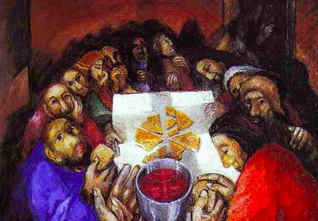“He who dies with the most toys wins ” – What would it take, really take, to make you content?3/16/2018
 What would it take, really take, to make you content? . . . to make you happy? . . . to make you satisfied? A fancy pickup truck, stocked with all the options, passed me on US Interstate 95 in Connecticut. My ancient mini‑truck was dwarfed by its size and flamboyance. I had a sense of feeling cheated. There I was, put‑putting along in my multicolored, very used ‘74 Chevy Luv. And, there was this guy, flashing by me in his shiny new behemoth. As he passed I noticed a bumper sticker neatly pasted to the thick and bright, shinny chrome rear bumper. He who dies with the most toys wins As far as the world with its toy-ish passionate pursuits was concerned, I was the obvious loser. But, I, in my aging pickup, knew something that fellow didn’t. Perhaps I should say I knew Someone he didn’t. When life consists of items of purchase and the fulfillment of temporal pleasures, the result is meaninglessness. The writer of Ecclesiastes cautions us to be careful where we look for contentment: So my heart began to despair over all my toilsome labor under the sun. For a person may labor with wisdom, knowledge and skill, and then they must leave all they own to another who has not toiled for it. This too is meaningless and a great misfortune. What do people get for all the toil and anxious striving with which they labor under the sun? All their days their work is grief and pain; even at night their minds do not rest. This too is meaningless (Eccl 2:20–23). I am amazed at the attitudes of my contemporaries. I am even more aghast because so many among the community of faith have been seduced by similar attitudes. Whether it is instant success, material affluence, or bigger and better churches, we believers can be accused of exchanging the Christ‑life for life as the world defines it. I am not a fan of Christian designer tee shirts. Much of what is plastered on them comes close to sacrilege. But I was pleasantly surprised by one shirt that mocked the boastful arrogance of that trucker’s life verse. It read: He who dies with the most toys still dies. A Vital Truth That slogan catches the essence of a vital truth. Christians, of all people, ought to know that this world and the things of this world are passing away (1 Cor 7:31; 1 John 2:15–17; Matt 7:24–29). Yet we have fashioned our criteria for meaningful spirituality and meaningful church life from the world’s models. Affluence and the American ideas of success and freedom are what count. But death, the common denominator, will expose our vanity in striving for the wind—striving for a world‑given, culture‑driven contentment. I ask the question again. What will it take to make you content? Perhaps our problem is rooted in how we become content. We have reduced contentment to its lowest common denominator—items we buy and feelings of comfort. Paul’s final words to the church at Philippi raise the Christian idea of contentment to its proper sphere. True contentment flows from a commitment to something worthy, something eternal, something beyond us. True contentment flows from a commitment to the gospel. We have come to the exhortative section of this letter in Philippians 4:1–20. The last half of it (4:10ff) is highly informative regarding Christian contentment. Before this the apostle exhorted his readers to imitate his life (3:17; 2:17–18; 3:4–14). He says it again in 4:9: “Whatever you have learned or received or heard from me, or seen in me—put it into practice” (Gordon Fee). There is no doubt that in this closing section, Paul continues to suggest that he has modeled the authentic Christian life, the deeper life. Restless Christians struggling to find contentment give rise to a self‑interest mentality within church communities. That, in turn, results in ill health for the Body of Christ. In 4:10–19, however, we discover a strong and dynamic connection between Christians’ level of contentment and their commitment to the gospel--and, as Philippians has been emphasizing, their commitment to church.
0 Comments
This is a fair contextual, occasional, and exegetical (perhaps even original and certainly possible) reading of the Philippians 4:6-7. First, I have taken mēden (“no one,” μηδὲν) as nominative (vocative, actually), that is, as the subject of the command, which is totally possible and perhaps even preferable, and not accusative (i.e., what to be anxious about, that is no-thing). Granted, virtually no Bible translation or commentator takes the word as nominative. But understand, this word is spelt the same in both the nominative and the accusative declension. Of course, I am still comfortable (exegetically) taking it as the content of what to be anxious about, that is be anxious about “no-thing” ( i.e., mēden, μηδὲν, as accusative meaning, “nothing”)—this is the way Paul is normally translated (lit, be anxious about nothing, or as the ESV has it, “Do not be anxious about anything”). Yet my rendering (which is completely possible) is fair and fits the gathered church occasion and context, that is a church gathered at an evening banquet-meal, time of worship, and instruction) in some believer's living room in Philippi. I read our letters from Paul a little differently now that I have better understanding what the worship setting and venue looked like at that time. Each of Paul's letters, most likely, would have been read at a local church’s worship-time, most likely on a Saturday evening (it would be almost 150 years before churches started meeting early Sunday mornings on a regular bases) in someone’s home (i.e., a house-church). We know the patterns, that is the setting—what it looked like. The early church would gather together for a full meal (i.e., a supper), worship, and instruction patterned after the banquet-meal-symposium that were common to groups, societies, cults, guilds, and paterfamilias (male head of households) throwing a banquet at his home throughout the Greco-Roman world. At these banquet-meal-symposia, where the host would celebrate and drink (lift and pour out) a cup of wine to Caesar and some god (small “g”), or at the honoring of some benefactor, the new church would gather locally to celebrate and drink (lift) a cup of wine to celebrate and remember the Lord Jesus Christ. Most certainly this explains the first command in the text: “Rejoice in the Lord always; again I will say, rejoice” (v. 4). The banquet-meal-symposium of a local gathered church would break bread at the beginning (marking the start of the worship and fellowship time) as Jesus did with his first disciples at the Last Supper. Then, they would share a meal together. At the end of this time, the host would raise a cup of wine to celebrate and remember the Lord Jesus Christ (which normally in a non church setting would have been toasted to caesar and/or a god or at least their house-hold god). Then, the host would he would welcome communal prayers of the guests and, then, there would be a lively time for apostolic instruction and teaching of the gospel (which was the symposium). If there was a letter from, say the Apostle Paul, it would have been most likely read (and discussed) at this time. So re-imagine Philippians 4:4-7 being read out loud (obviously with the rest of the letter) at the just celebrated Table of the Lord (i.e., the lifting of the cup). Now hear the nuances of this setting, fellowship, and instruction. “Rejoice in the Lord always; again I will say, rejoice. Let your spacious generosity and humbleness [my rendering of the word, "gentleness," or "reasonableness" in the text] be known by all (who are at the Table of the Lord in the midst of your gathering together for worship [which fits the reason of the Letter in the first place, to heal conceited division and bring about joyous unity]. The Lord is near [a perfect phrase to mark the lifting of the cup and remembering the Lord and His kingdom have come]. No one (at the table, celebrating the Lord’s Supper at worship) be anxious. But! In all things by prayer and supplication with thanksgiving, your requests, make them known to God; and, the peace of God, which surpasses all understanding, will guard your hearts and your minds in Christ Jesus.” The power of this reading can be felt. May it be so in your own gathering of the saints.
|
AuthorChip M. Anderson, advocate for biblical social action; pastor of an urban church plant in the Hill neighborhood of New Haven, CT; husband, father, author, former Greek & NT professor; and, 19 years involved with social action. Archives
February 2024
Categories
All
|
Pages |
More Pages |
|


 RSS Feed
RSS Feed